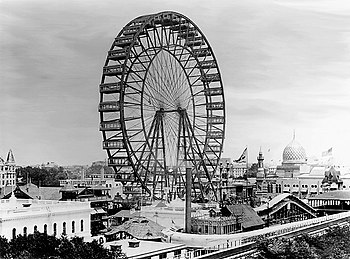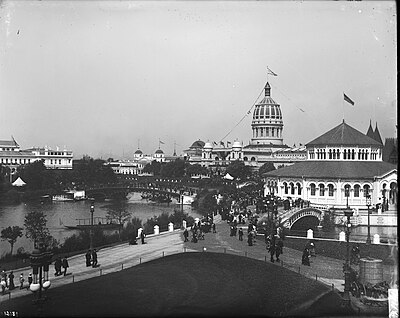In 1492 Columbus came to the Americas. This is a well known among English-speakers, because that year happens to rhyme with the color of the ocean. Far fewer people know what happened 401 years later--The World's Columbian Exposition. "Exposition" doesn't rhyme so neatly as "blue."
In 1889 France built a tower out of scrap metal and invited the world to come have a look. Food was served and they called it the "Exposition Universelle." I don't know how many people were invited, or who répondez s'il vous plaî-ed, but 28,000,000 people showed up. The whole thing was an incredible success; the U.S. became jealous.

To understand the national reaction, you have to remember the United States was dating England exclusively. They broke up, and the U.S. scored France on the rebound. The two started hanging out, talked together about how fat and ugly England was, and had a whirlwind romance. The United States was going through a revolution. It was fun and exciting. We got some sugar from France, in terms of money and naval support. The mutual love was commemorated with his-and-her statues of women holding torches. Soon France got into it's own revolution and war, and came looking for similar support. Under the direction of President Washington, the U.S. stopped answering France's calls. France drove by the house a couple of times, but the U.S. pretended we weren't home. It was mean, but we were still young, immature, and didn't know how to deal with strong emotions and socially delicate situations.
When the Exposition Universelle made France the belle of the international ball, our Congress couldn't stand it. It's hard to have a lot of people paying attention to your ex. The U.S. had to have another ball. Now. Congressional committees, working as fast as Congressional Committees can, narrowed down the possible venues to three American cities: Washington D.C., New York, and Chicago. New York was the gem of the country. D.C. was the nation's capital. Chicago, by contrast, was a stinking expanse of rail yards, slaughter houses, cattle yards, mud streets, and run down tenaments.
Illinois was the American frontier--everything West being rocks, dirt, pine trees, Native Americans, gold miners, and Mormons.
Whatever Chicagoans lacked in sophistication, they made up for with heart. If you've ever lived and fallen in love with a city that's considered provincial, you'll understand how readily defensive the tip of the tongue becomes. The people of Chicago were so adamant in blustering boasts of their city's merits, that New Yorker's, in derision, started calling Chicago "The Windy City."
New York could make fun and tease all they wanted. Congress gave Chicago the Columbian Exposition. To stick it to France, Chicago was going to throw the world a party on the 400th anniversary of an Italian, sailing for Spain, trying to reach India, accidentally landing in America. What could be more natural?



I'm not trying to show off. I never would've learned any of this if I hadn't met Al.

No comments:
Post a Comment